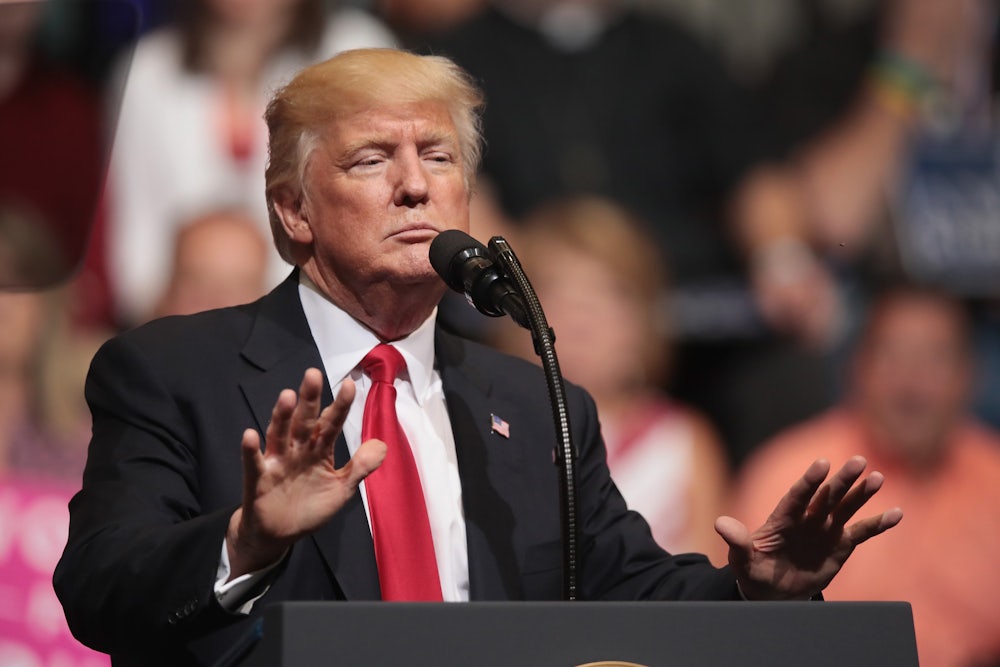President Donald Trump’s position on repealing and replacing Obamacare has been all over the place. After the House narrowly passed the American Health Care Act in May, he and the chamber’s Republican leadership celebrated in the Rose Garden. Trump declared it an “unbelievable victory,” despite the fact that the ball he was spiking was still on the 50-yard line. Then six weeks later, Trump told the Republican senators who were crafting their own version of the bill that the AHCA, which would uninsure some 24 million people, was “mean.” He reportedly urged them to create a “more generous” alternative.
This schizophrenic messaging is characteristic of Trump’s entire presidency, but it’s particularly relevant to his approach to health care. There’s evidence that Trump’s numerous promises on the campaign trail about health care helped propel him to victory. While many voters were skeptical of the GOP’s position on the issue, Trump’s appeals were surprisingly liberal. He promised “insurance for everybody.” He said that there would be “no cuts to Medicaid,” that “no one will lose coverage,” and that “nobody will be worse off financially.” In a memorable exchange with Senator Ted Cruz in February 2016 during the Republican primary, he insisted that, unlike his heartless conservative rivals, he would not let people “die in the streets.”
The message was clear: Voters might think that the GOP’s approach to health care was cruel, but Donald Trump was not a normal Republican.
The bill that the Senate unveiled on Thursday—the Better Care Reconciliation Act—is cruel. If enacted it will result in people—particularly lower-income and middle-class people—paying substantially more for substantially less coverage. The bill’s $800 billion in Medicaid cuts would result in an unprecedented transfer of wealth from the poor to the rich. Experts that looked at the House’s bill projected that it would directly lead to thousands of people dying every year, and the Senate’s bill will likely do the same. If Trump signs this bill, people will die in the streets.
This is precisely the outcome Trump said he would not allow. On top of that, the AHCA is incredibly unpopular—more unpopular than Trump, which is no small accomplishment. And while Trump has spent much of the his first six months in office fighting back allegations that his campaign colluded with Russian intelligence, all the available polling data suggests that health care is the most damaging issue facing his administration. Everything suggests that signing this bill would be political suicide.
Still, he might just do it anyway.
When Trump finally acknowledged the Senate’s bill late on Thursday, he was noncommittal. He wrote that he’s “very supportive” of the bill, but noted that it’s not a finished product.
I am very supportive of the Senate #HealthcareBill. Look forward to making it really special! Remember, ObamaCare is dead.
— Donald J. Trump (@realDonaldTrump) June 22, 2017
Space for negotiation has already been baked into the Senate’s bill. It seems likely that both right-wing Republicans and moderate Republicans who are ostensibly on the fence will extract concessions that will allow them to vote for the bill. However, for liberal activists and Democrats looking to influence the debate, the potential holdouts suggest that there is a narrow path forward to blocking the bill in the Senate, in the form of organizing, calling, protesting, and generally raising hell.
Another path may be through Trump himself. While he has stated repeatedly that he wants to repeal and replace Obamacare, he has also gotten in the way of his own message by insisting that a reform bill does things these bills do not do, most notably lower costs, increase coverage, and not kill lots of people. If the bill does pass the Senate and some form of it ultimately ends up on the Resolute Desk, the calls for Trump to veto the bill will be deafening. He will also have to contend with the fact that signing the bill as is could very well cost him his job in 2020.
Congressional Republicans have apparently concluded that repealing Obamacare is worth the political costs. Senate Majority Leader Mitch McConnell can look at the four special elections in 2017, which were all won by Republicans, and argue that a combination of negative partisanship and an influx of super PAC money may be enough to withstand the liberal mobilization that will follow the repeal of Obamacare. They can also cynically continue to blame Obamacare for whatever horrible things are happening in the market, claiming it has nothing to do with their legislation.
The gist: Rs will say that any problems with HC come November 2018 are the aftershock of Obamacare. Vote for Rs, who will keep fixing it!
— Dave Weigel (@daveweigel) June 22, 2017
This would seem too clever by half, but it’s better than the alternative, which is running on the merits of the AHCA. Just as Trump has continued to run against Hillary Clinton, he and other Republicans will continue to run against Obamacare. The suffering the AHCA will cause will in effect be its own political reward.
Then there’s the suffering that the bill will cause to Democrats in particular. If Trump understands one thing it’s the tribalism that defines American politics. The mere fact that Democrats are upset is appealing to Republican voters. In Georgia, Karen Handel ran a campaign largely based on a desire to punish and humiliate Democrats, and the fact that the AHCA does both things will undoubtedly be a huge part of Trump’s messaging on the issue.
In the GOP’s (inaccurate) version of events, Obamacare was Democrats taking benefits from Republicans and giving them to people who weren’t American (read: nonwhite). Trumpcare rights the scales. Trump ran and won in 2016 by making precisely this kind of pitch, and there’s no reason he won’t do it again in 2020.
